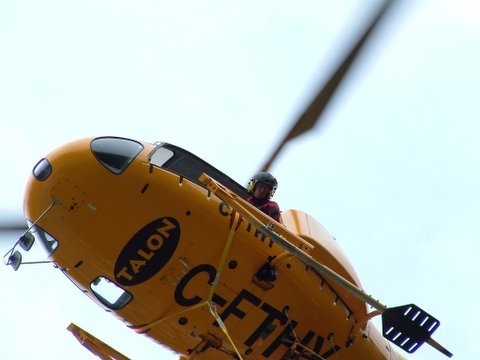SAR Day 10: CPR/AED

You may have noticed that SAR training usually takes place on a Tuesday. So why a post from Thursday?
Well the next four weeks several members are taking Advanced Wilderness First Aid for SAR Operations, a course developed for us in consultation with Slipstream, the Canadian Red Cross, and approved by the Wilderness Medical Society.
As SAR members most of us have done so many first aid courses that this is familiar ground. Since all of the people taking the course are SAR members we’re free to tailor the course toward our particular needs. For example, most wilderness first aid courses focus on improvisation in many areas: constructing splints, purifying water, and making litters to carry injured or immobile subjects. SAR teams usually have equipment on hand to handle those tasks. Another example, wilderness first aid focusses on maintaining the health of the subject until rescue shows up to take over. Well since we’re the rescue unit, we focus on the tasks we would likely be called to do when we take charge. We also stress the need for documentation and communication of vitals to base, and in order to asses weather the subject is stable and can be transported. Making the decision on what kind of equipment needs to be sent for various injuries, and what level of urgency to use for transport is also important.
Basically, first aid from the SAR point of view usually happens an house or so after in initial injury, so while we train to handle emergency conditions, they are more for cases where a team member gets injured while searching of rescuing a subject.
Last night in part one of the course we recertified in CPR Level C and AED. The AED is one of those examples of a device that is usually used immediately after a cardiac event in order to determine weather a shock will restart the heart. In the case of an event that happened last year, a SAR member and paramedic was long lined in to a scene where a subject had suffered a heart attack. He used an AED/cardiac monitor to determine that there was no pulse and no shockable rhythm. This, the fact that CPR had been administered for nearly an hour, and with consultation from a doctor over the radio, allowed this member to determine that the subject was deceased.
The course continues on Saturday and Sunday: big SAR-related weekend.
If this is anything like the last time we did this course, we will probably get a call to do a rescue.

Leave a Reply